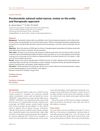 December 2023 in “Scientific reports”
December 2023 in “Scientific reports” Fermented soy protein may help prevent bone loss by affecting bone cell activity.
 October 2023 in “International journal of biology, pharmacy and allied sciences”
October 2023 in “International journal of biology, pharmacy and allied sciences” Henna helps wounds heal faster and better.
 May 2017 in “bioRxiv (Cold Spring Harbor Laboratory)”
May 2017 in “bioRxiv (Cold Spring Harbor Laboratory)” The peach gene pCTG134 helps control the interaction between auxin and ethylene hormones during fruit ripening.
 June 2014 in “Journal of biomedical research”
June 2014 in “Journal of biomedical research” Sargassum fusiforme extracts help promote hair growth.
 August 2023 in “Processes”
August 2023 in “Processes” Fermenting Dendrobium officinale with Lactobacillus reuteri CCFM8631 increases its skin care benefits.
August 2024 in “Nutrients” Probiotics help reduce hair loss and increase hair growth in people with androgenic alopecia.
August 2024 in “Scientia Horticulturae” AMF initially inhibits but later promotes citrus root hair growth by regulating auxin levels.
 5 citations,
April 2023 in “BMC Microbiology”
5 citations,
April 2023 in “BMC Microbiology” Shampoo with heat-killed Lacticaseibacillus paracasei GMNL-653 improves scalp health and hair growth by changing scalp bacteria.
 5 citations,
October 2022 in “Phenomics”
5 citations,
October 2022 in “Phenomics” Your skin is like an ecosystem, with its own community of microbes and substances that interact and affect its health.
 2 citations,
July 2023 in “Agronomy”
2 citations,
July 2023 in “Agronomy” Melatonin helps wheat plants resist drought by improving their root and root hair growth.
 2 citations,
January 2022 in “Stem cell biology and regenerative medicine”
2 citations,
January 2022 in “Stem cell biology and regenerative medicine” Extracellular vesicles, including exosomes from certain cells, can stimulate hair growth.
 December 2022 in “Journal of Experimental Biology and Agricultural Sciences”
December 2022 in “Journal of Experimental Biology and Agricultural Sciences” Using certain plant growth regulators together improves the cloning of the medicinal plant Eclipta alba.
63 citations,
September 2020 in “Frontiers in Microbiology” Probiotics show promise for health benefits but need more research to understand how they work.
 12 citations,
September 2022 in “Foods”
12 citations,
September 2022 in “Foods” Some nutraceuticals may help in COVID-19 prevention and treatment, but more research is needed.
 10 citations,
September 2021 in “International Journal of Nanomedicine”
10 citations,
September 2021 in “International Journal of Nanomedicine” Tiny particles called extracellular vesicles show promise for treating skin conditions and promoting hair growth.
7 citations,
February 2017 in “Open veterinary journal” Tiger cubs fed artificial milk lacking certain amino acids developed eye problems and hair loss.
4 citations,
May 2022 in “International journal of molecular sciences” Heat-killed Enterococcus faecalis EF-2001 may promote hair growth and transition hair follicles to the growth phase.
2 citations,
December 2023 in “International journal of molecular sciences” Wound healing is greatly affected by the types of bacteria present, which can either help or hinder the process.
 2 citations,
February 2022 in “BioMed Research International”
2 citations,
February 2022 in “BioMed Research International” LED light therapy at 863 nm wavelength can slow down skin tumor growth and reduce inflammation in mice.
 1 citations,
January 2023 in “Metabolites”
1 citations,
January 2023 in “Metabolites” Changes in gut bacteria can contribute to the development of Polycystic Ovary Syndrome (PCOS), affecting metabolism, immunity, and causing inflammation. Treatments may involve adjusting these factors.
 November 2024 in “Fermentation”
November 2024 in “Fermentation” Fermented ginsenosides from kimchi bacteria may promote hair growth better than finasteride.
June 2024 in “Regenerative Therapy” Exosomes from stem cells may help rejuvenate skin and regrow hair, but more research is needed.
 April 2024 in “Histochemistry and cell biology”
April 2024 in “Histochemistry and cell biology” N-acetylcysteine may prevent hair loss caused by chemotherapy.
 February 2024 in “Scientific Reports”
February 2024 in “Scientific Reports” Cinnamic acid may help hair grow by activating oxytocin receptors.
 February 2024 in “Skin health and disease”
February 2024 in “Skin health and disease” Exosomes could improve skin and hair treatments but are limited by cost, production difficulty, and need for more research.
 November 2023 in “Frontiers in Neuroendocrinology”
November 2023 in “Frontiers in Neuroendocrinology” Some people experience lasting sexual, psychological, and sleep problems after using finasteride or SSRI antidepressants, possibly due to similar underlying causes.
 January 2023 in “International Journal of Molecular Sciences”
January 2023 in “International Journal of Molecular Sciences” Maxillariinae orchids contain 62 compounds with potential health benefits, including treating skin conditions and diseases like cancer and diabetes.
 December 2022 in “Türk biyokimya dergisi”
December 2022 in “Türk biyokimya dergisi” The conclusions are: fecal short-chain fatty acids may help prevent cancer, fiber intake can reduce obesity, weight loss is hard for obese people, low BMI cancer patients are more prone to chemotherapy side effects, intermittent fasting benefits gut health, cherry laurel has health benefits in rats, certain gene variations can increase stress in hair loss patients, fecal acids can affect blood sugar levels, cold agglutinin can affect blood test results in autoimmune patients, and people with Crohn's disease have higher levels of a certain chemical in their blood.
Heated radish extract may help lighten skin and reduce aging signs.
 23 citations,
September 2014 in “JEADV. Journal of the European Academy of Dermatology and Venereology/Journal of the European Academy of Dermatology and Venereology”
23 citations,
September 2014 in “JEADV. Journal of the European Academy of Dermatology and Venereology/Journal of the European Academy of Dermatology and Venereology” Laser treatments are the most effective for porokeratotic adnexal ostial nevus.






















